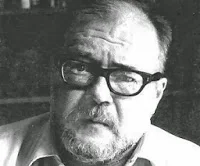por Pablo Santiago Chiquero
Dice el poeta James Wright (Ohio, 1927-Nueva York, 1980), uno de los nombres más importantes de la lírica norteamericana de la segunda mitad del siglo XX, en esta entrevista en The París Review: "Los hombres somos una parte infeliz de la naturaleza, quizás simplemente naturaleza que se ha vuelto consciente de sí misma. ¡Oh, cómo me gustaría ser un pájaro, un carbonero por ejemplo! Pero no puedo ser un carbonero, todo lo que puedo ser es lo que soy. Amo el mundo natural y soy consciente del dolor en él. Así que soy un poeta de la naturaleza que escribe sobre los seres humanos en la naturaleza“. La cita no es banal, pues despeja mediante palabras del propio autor una de las claves del poemario No se quebrará la rama, recientemente publicado por Vaso Roto Ediciones. Wright, premio Pulitzer por sus Collected Poems, confiesa su interés por escribir "sobre los seres humanos en la naturaleza", y eso es precisamente lo que encontramos en las páginas de este poemario descriptivo y detallista, el más cercano a la naturaleza de los que escribió el poeta, y que podemos leer en español gracias a la lograda traducción de Antonio Rivero Taravillo. En los versos de Wright encontramos una constante contraposición entre el hombre y la naturaleza, entre el tiempo humano y el tiempo, en apariencia imperturbable, del mundo, entre el paisaje inalterado de los bosques, prados y montañas y los paisajes tristones y melancólicos –estaciones de tren, cuencas mineras, cementerios–que genera la actividad del hombre.
"Muchos animales que nuestros padres mataron en América
tenían ojos vivaces.Salvajemente escrutaban en derredor, al oscurecerse la luna.La luna nueva cae en los depósitos de mercancias de las ciudades del sur, pero que las oscuras manos de Chicago pierdan la lunano importa a los ciervos en este prado norteño“.
Como seres arrancado de la naturaleza, nos dice el poeta, solamente nos queda mirar salvajamente alrededor, añorando esa comunión perfecta con el mundo que una vez tuvimos, y que hoy pertenece a los animales. Sí, la naturaleza pone en evidencia nuestra propia fugacidad en este mundo, pero también es ella la que nos entrega imágenes cotidianas de belleza sin las que la vida sería difícilmente soportable. Porque, ¿quien no ha visto alguna vez esta escena?
"En un pino,
a poca distancia de mi alfeizar, un arrendajo azul brillante salta y cae, salta y caeen una rama.Me río cuando lo veo abandonarse a un completo goce, porque sabe tan bien como yoque no se quebrará la rama“.










